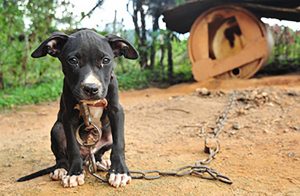
National Dog Fighting Awareness Day is a necessary measure to help stop one of the most horrific forms of animal abuse imaginable.
Despite the public outrage that followed the Michael Vick case, the HSUS (the Humane Society of the United States) estimates more than 40,000 people participate in organized dogfighting in the U.S., and hundreds of thousands more take part in impromptu street dogfighting.
According to the ASPCA, “dog fighting is one of the most heinous forms of animal cruelty. Fighting dogs are typically raised in isolation, so they spend most of their lives on short, heavy chains. They are regularly conditioned for fighting through the use of drugs, including anabolic steroids to enhance muscle mass and encourage aggressiveness. Fighting dogs may have their ears cropped and tails docked close to their bodies to minimize the animal’s normal body language cues and to limit areas that another dog can grab during a fight. Fighters usually perform this cropping/docking themselves using crude and inhumane techniques.
Although dog fighting is a felony in all 50 states, it continues to occur in every part of the country and in every type of community. Fights can happen in a variety of locations ranging from back alleys to carefully-staged enterprises.”
What Are the Laws Related to Dog Fighting?
As of 2008, dog fighting is a felony in all 50 states and in the District of Columbia, Guam, Puerto Rico and the U.S. Virgin Islands. In most states, the possession of dogs for the purpose of fighting is also a felony offense. Being a spectator at a dog fight is also illegal in all states. Laws and penalties vary widely by state.
On the federal side, the Animal Welfare Act of 1966 prohibits certain animal fighting-related activities when they have involved more than one state or interstate mail services, including the U.S. Postal Service. In 2007, Congress passed the Animal Fighting Prohibition Enforcement Act with strong bipartisan support. The Act amended the Animal Welfare Act and provides felony penalties for interstate commerce, import and export relating to commerce in fighting dogs, fighting cocks and cockfighting paraphernalia. Each violation can result in up to three years in jail and a $250,000 fine.
In 2014, the crucial elements of the Animal Fighting Spectator Prohibition Act were signed into law as part of the Farm Bill. This provision makes attending an animal fight anywhere in the U.S. a federal offense, and imposes additional penalties for bringing a child under 16 to an animal fight.
How can you help end dogfighting?
Communicate to the U.S. Sentencing Commission (USSC) to get tough on dog fighting by committing to stronger sentencing guidelines for convicted animal fighters.
If you see something suspicious, report it to your local police department and to local animal welfare groups. To report dogfighting, you can also call the following tip line: 1.877.TIP.HSUS
Call. Don’t assume someone else will do it.
If you witness a dogfight in progress, call 911 immediately.
If you suspect that dogfighting is taking place at a residence, call the HSUS tip line at 1-877-TIP-HSUS. You can receive a reward of up to $5,000 from The HSUS if your tip leads to the conviction of a dog fighter. For information on how to claim a reward, visit humanesociety.org/rewards.
If you see an animal that appears to be neglected outside of involvement in dogfighting, please contact your local humane society, animal control or law enforcement agency.
Here’s an excellent publication on how to recognize some of the signs of dog fighting.








